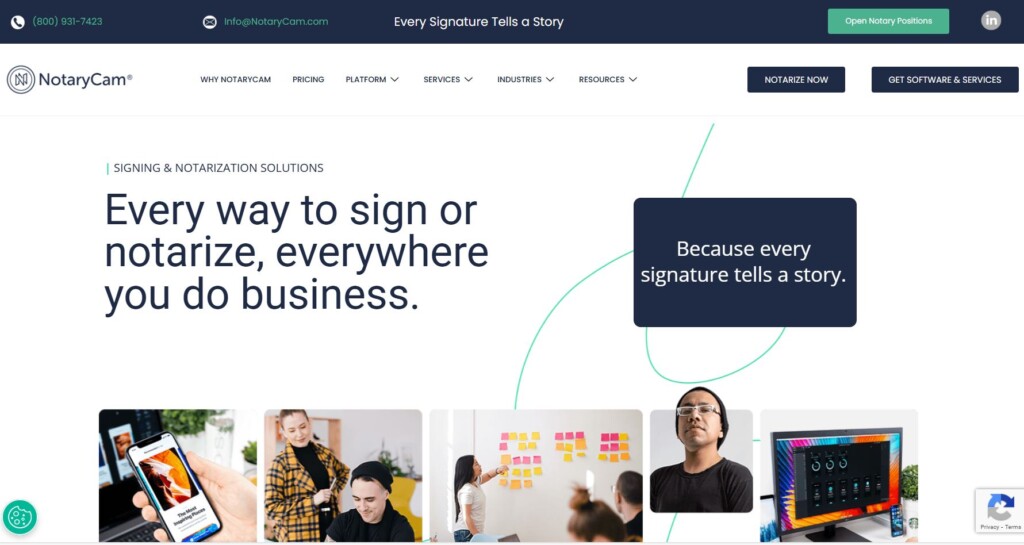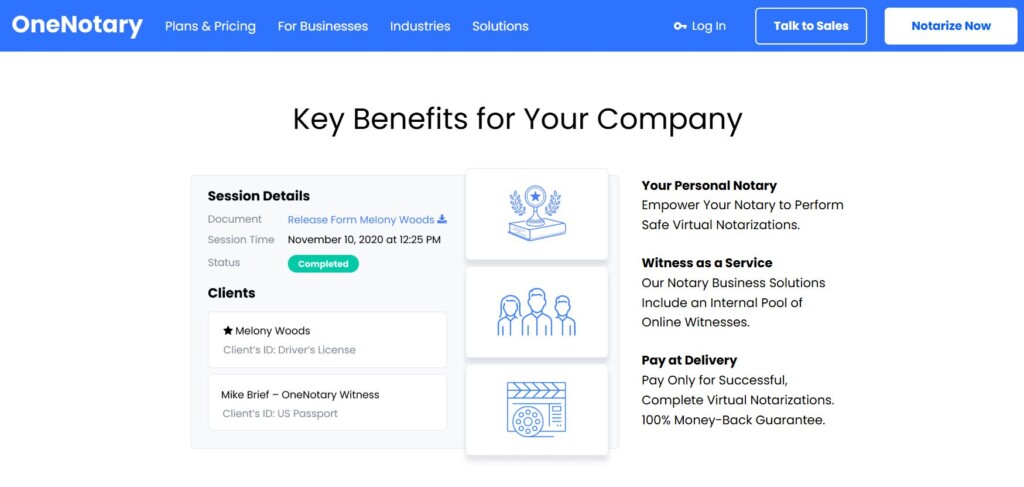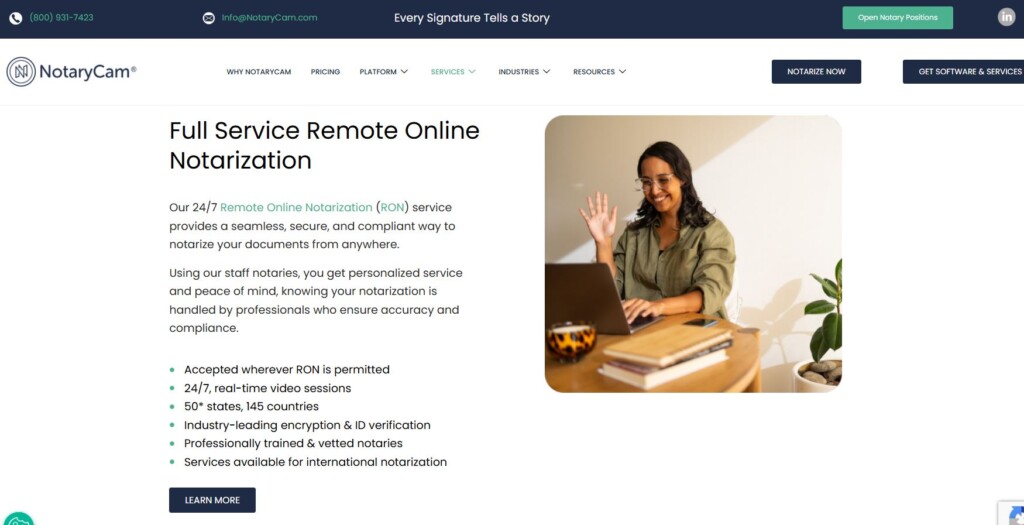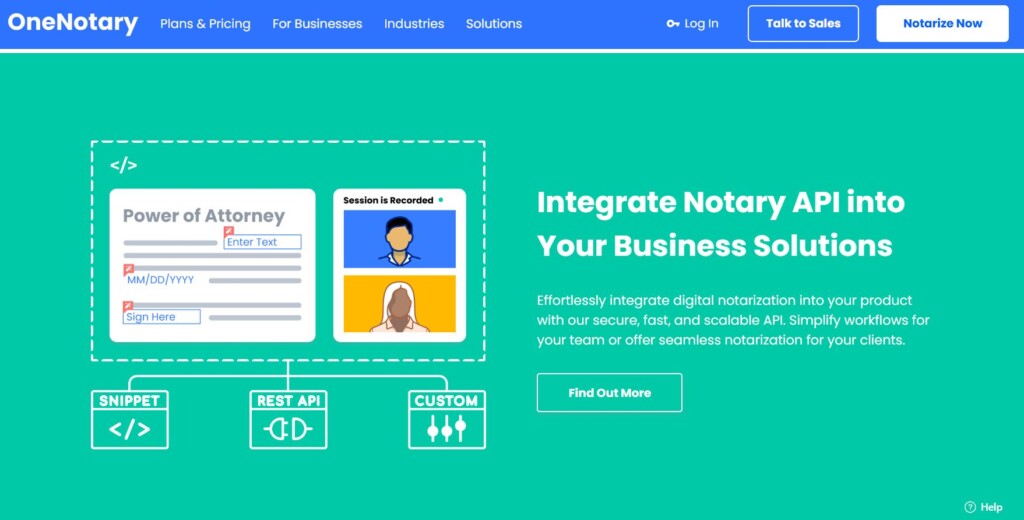Last Updated on September 29, 2025 by Ewen Finser
Alright guys, let’s talk about some real dry content for a minute. I use notary services often, probably over 10 or 15 times a week, so it’s important for me to have on demand access to notary services as needed if my book keeper isn’t nearby to notarize something for me quickly. The reason? Well, my clients send time-sensitive forms across state lines, and I often have to notarize powers of attorney, vendor agreements, lien waivers, real-estate packets, and the random “can you notarize this today?” request that lands at the end of the day right before I’m getting ready to head to the house for the evening. So I’ve turned to using online notary services, and I’ve settled up on two: Notarycam and OneNotary. Each has its pros and cons, but I want to talk about them because when I’m working for clients I need:
- Predictable pricing for one-off notarizations and for volume
- Strong identity proofing and audit trails
- Clear storage and retention rules
- Integrations that cut extra steps
- A path to scale without retraining staff
Both NotaryCam and OneNotary check those boxes. The difference comes down to cost structure, integrations, and how each one fits the way you collect signatures and run your back office.
Snapshot: Who’s Who?
- NotaryCam is a mature RON (Remote Online Notary) provider with clear depth in real estate and lending. It markets eClose support, MISMO-certified software for mortgage closings, and enterprise options. It also offers individual notarizations for general documents.
- OneNotary is a flexible RON platform with simple retail pricing, business plans, an API/low-code integration, and legal-practice integrations. It also advertises I-9/E-Verify workflows, which can help with HR teams.
Both run 24/7 networks of commissioned notaries and support common document types (PDF, standard forms). They also both handle online ID checks and video sessions.
Pricing Comparison
For day-to-day decisions, price clarity matters. Luckily, both platforms are very transparent about what it’ll cost you to get the services you need.
OneNotary (individuals and businesses):
- Individuals: “Online notarizations start at $25.” I want to note it’s $25 per online notarization for one seal and one signer, additional signers cost, well…additional.
- Business/teams: Online notarizations start at $25, with options akin to unlimited team members, custom branding, APIs, and “Signer pays” routing. The business page highlights mobile notarization starting at $80, which I’ve never used before, but could be handy if you’re in a desperate pinch!
- The webpage also showcases what extra goodies you can purchase, though these vary by plan and payer. If you run volume, confirm the exact per-transaction structure with one of their sales consultants.
NotaryCam (individuals and professionals):
- Most documents are listed at $25 per seal for one signer, with $10 per additional signer, plus a separate fee for signers without a U.S. SSN (listed at $79).
- For wills and trusts, the site lists $175 per document and shows extra fees for additional signers or cancellations. This is a specialty lane with higher friction and risk, so the premium tracks, in my opinion.
- NotaryCam also offers software licensing for independent notaries with published onboarding and monthly fees, and caps around per-transaction billing for that model. This is useful if you plan to enable your own notaries.

Bottom line on price: for standard, one-off personal docs, both show a $25 entry point, but their add-ons (extra seals, extra signers, special document types) diverge a little bit. If you handle many low-complexity notarizations, OneNotary’s simple $25 headline and team features will feel easy to budget. For high-stakes estate or mortgage work, NotaryCam posts rates and programs that reflect that complexity and its domain focus.
Identity, Security, and Compliance
This is where I get picky. I want clear audit trails and long-term retention because if someone ever tries to point a finger at me, I want to be able to point it right back at them.
- NotaryCam states that it is a MISMO certified RON (Mortgage Industry Standards Maintenance Organization…Remote Online Notary…say that 3x fast!) software that is ideal for real-estate transactions. NotaryCam also notes it is SOC 2/NIST (common I.T. slang for “I’m very secure”) across its enterprise pages. It also highlights 10-year retention for video and the notary journal.
- OneNotary highlights robust verification, unlimited storage on certain plans, and standard RON artifacts (video/audio session, tamper-evident docs). Their webpage also notes that session recordings are stored for 10 years, which is table stakes for many regulated workflows.
In my opinion, both meet the baseline you want for audit-ready files: identity proofing, a secured video session, and retrievable records. If you live in mortgage, title, or servicer workflows, NotaryCam’s published MISMO references may help with lender comfort. If you live in law, HR, accounting, or general business, OneNotary’s simpler packaging and integration hooks can be enough.
Integrations and Workflow Fit
OneNotary
- API / low-code integration: You can embed notarization into your app or site with a “one API method” flow. That matters when you want clients to finish in your portal without context-switching.
- Clio: If you run a law practice or in-house legal, tying sessions to matters in Clio reduces back-and-forth and keeps your document trail clean.
- HR/I-9: OneNotary markets Remote Form I-9 + E-Verify integration, which is useful for distributed hiring.

NotaryCam
- Real estate stack: NotaryCam publishes content and programs around eClose, RON closings, and lender/servicer use cases. If you work with investors, lenders, and title agencies, the depth here shows; it’s basically their whole schtick.
- Independent notary software: If your organization uses its own commissioned notaries, the licensing program gives you tools to run RON in-house with set fees and training.
In my firm, the integration question is simple: will this reduce staff clicks and client confusion? If yes, it wins. The end, it’s that simple!
Industry Focus and Who Fits What Business Best
NotaryCam shines when:
- You need mortgage-grade features and comfort (eClose programs, loss-mitigation work, servicer processes),
- Your counterparties ask for a MISMO-certified platforms, or
- You plan to license software for your own in-house notaries with published caps and fees.

OneNotary fits best when:
- You want straight $25 entry pricing, fewer moving parts, and easy hand-offs,
- You want API embedding or Clio integration for legal operations, or
- you need I-9/E-Verify to support remote hiring.
How They Stack Up Head to Head
- Entry price for common documents
- NotaryCam: $25 per seal; add-ons apply.
- OneNotary: $25 per notarization (one seal/one signer on the individual page).
- Specialty pricing
- NotaryCam: Wills/Trusts page shows up to $175 per document.
- OneNotary: Business pricing page highlights volume features; confirm add-on rates by plan.
- Compliance signals
- NotaryCam: MISMO RON compliance; SOC 2/NIST mentioned across enterprise pages; 10-year retention.
- OneNotary: Robust ID verification; unlimited storage on certain plans; external listing notes 10-year video storage.
- Integrations
- NotaryCam: Deep real-estate workflows and lender programs.
- OneNotary: API/low-code, Clio, I-9/E-Verify.
What All This Means in Real Life
Client onboarding and POAs. When I need a quick power of attorney notarized for a tax or banking issue, both platforms work. I send the client a link, they verify ID, we hop on a quick video, and I get a tamper-evident PDF with a video record. For one-off matters, both platforms are close.
High-volume seasons. During year-end or a transaction rush, my staff appreciates fewer steps and consistent pricing. OneNotary’s $25 starting point and the “Signer pays” option make billing clean. If we need extra seals for some reason or multiple signers often, I still confirm the final math on which is cheaper so we avoid invoice surprises.
HR and remote hiring. I like OneNotary’s nod to I-9/E-Verify for employers with multi-state teams. That keeps larger companies with HR teams from having to juggle a separate tool for identity checks and mitigates onboarding delays.
Discovery and audit trails. If something goes sideways, you want clean retention. NotaryCam states 10-year journal and video retention on its software/services pages. OneNotary’s listings indicate 10-year storage for recordings as well, though I still capture the exact retention clause in the MSA/SOW.

Risks and Gotchas to Watch
- Extra seals and signers. That is where invoices creep. Read the price tables and confirm how each platform counts “seals” vs. “stamps” vs. “notarial acts.” NotaryCam uses “per seal” pricing on its general page. OneNotary’s “per notarization” framing for individuals is straightforward; business plans handle things a little differently in my experience.
- Special documents. Wills and trusts often carry a premium on NotaryCam. Check whether your use case lands in a special tier before you send the link to a client.
- Jurisdiction and acceptance. RON law varies by state, and acceptance in real estate can depend on county recorders and lender policy. Both platforms remind users to verify local requirements, but I’ve never seen an issue with either.
- Storage and retrieval. Ask where videos and journals live, how long they’re kept, and how you retrieve them. NotaryCam publishes a 10-year figure on its site; OneNotary’s public materials and directories indicate long-term storage as well. Lock this down in your contract if it’s something that worries you.
Who Should Choose What
Choose NotaryCam If You:
- Work in real estate, mortgage, or servicing, and want MISMO-aligned posture out of the box
- Need a vendor with specific eClose programs and a track record lenders recognize
- Plan to license RON software for your own notaries, with published caps and training
Choose OneNotary if you:
- Want simple, predictable pricing for common business and personal docs
- Need to embed notarization into your app or portal using an API/low-code route
- Want legal-ops or HR ties like Clio and I-9/E-Verify to avoid tool sprawl
My Verdict as a CPA
If your world is mortgage and title, or you need to reassure lenders and underwriters fast, NotaryCam is hard to beat. The MISMO language, eClose content, and enterprise framing help grease the gears and keep workflows flowing smoothly.
If your world is legal, accounting, HR, or general business and you value clean pricing and easy integration, then OneNotary edges ahead. The $25 starting point keeps friction down for clients, the API keeps my team in our own systems, and the Clio path is a plus for firms and in-house counsel. In my shop, that balance pushes me to OneNotary for most day-to-day work, while keeping NotaryCam on the list for real-estate-heavy matters.

